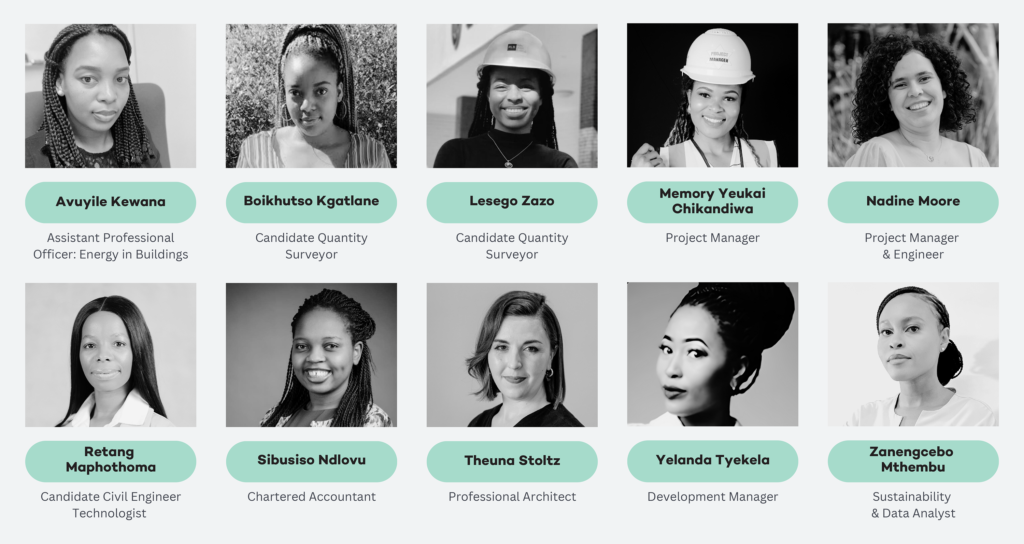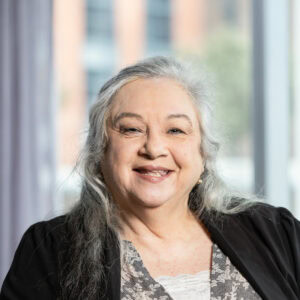Introducing the IFC Women in Green Building Competition Top 10 Finalists
Every year on Women’s Day in South Africa, we celebrate the incredible contributions women make in various fields. But it’s easy to forget that the importance of this day runs much deeper than simple admiration for women’s accomplishments. The underlying reality is that women still face significant underrepresentation and inequality in all sectors of the economy, especially in top management and C-suite positions.
At GBCSA, we believe that including women, from all walks of life, at the table is not just a ‘nice to have’ or ‘doing the correct thing’; it’s vital. It’s because we cannot afford the loss of resources that NOT having women in the room represents. When we don’t fight for an array of diverse voices, we are poorer for it. In essence, we lose something irreplaceable when everyone does not have a meaningful seat at the table.
Globally women hold just 28% of management positions in the workplace (UN 2023 Gender Snapshot across the SDGs). Unfortunately, deeply rooted biases against women and systemic barriers are still preventing progress in achieving global gender equality goals. The South African government lead many countries with 43% of women holding seats in parliament as opposed to the global average of 27%. The private sector in South Africa does not follow the SA Government representation example and is closer to the global average.
As we acknowledge the unique contributions women make, it becomes clear that their involvement is not just beneficial but essential. Their presence at the table helps us do better – by making smarter, more sustainable, and more inclusive decisions in the built environment.
What we are doing to promote gender equality in the green building sector
Gender representation matters as much in the green buildings industry as it does in any other. Climate change disproportionately affects those vulnerable to poverty, including over 340 million women and girls who could still be living in extreme poverty by 2030. Achieving workplace gender equality requires an additional $360 billion annually (UN 2023 Gender Snapshot). Despite these daunting numbers, real change begins with small but mighty steps in the form of targeted initiatives.
One such initiative, in partnership with the GBCSA, is the International Finance Corporation (IFC) Women in Green Building Competition which aims to empower and upskill women professionals in the property and construction sectors. It was conceived and launched in 2022 as part of the IFC’s Excellence in Design for Greater Efficiency (EDGE) and Design for Greater Efficiencies (DfGE) programmes. The GBCSA were brought on as the perfect implementation partner due to the alignment in values and long history of collaboration with the IFC, as well as GBCSA’s commitment to promoting women’s development. The competition offers 10 top participants the opportunity to gain EDGE Expert green building training and exam access, thus enhancing their skillsets and service offerings with green building expertise and supporting their growth within the green economy.
The 2024 competition runs from June to October and this Women’s Day we are proud to announce the top 10 finalists – a group of diverse women from various corners of the property sector. After completing their EDGE exams in October, the top three will receive free tickets to the 2024 Green Building Convention, worth R8 500 per person and the first-place winner will also receive a R10 000 Incredible Connection voucher.
Exploring the unique qualities that women bring to the table

Above: The four judges of the 2024 competition
Women bring empathy, vulnerability, and collaboration
“Women inhabit a superpower: empathy – a vital tool needed to identify with others and understand their point of view,” says competition judge, Gretchen Williams, GBCSA Education Manager. Women’s unique skills drive growth and inclusivity. Women are naturally wired for long-term strategic vision and building social bonds with a sense of purpose and belonging, and these are all key elements to creating a culture of excellence and psychological safety.
We need to build ‘better tables’
Judge and GBCSA Technical Specialist, Ann-Mari Malan, refers to the words of Lily Singh for inspiration: “Rather than just giving women a seat at the existing table, it is time to ‘build better tables’.” Instead of expecting women to constantly adapt to existing tables, cultures, and rituals, we need to build new and better ways of working that are organically inclusive.
We need women’s perspectives to tackle the climate challenge
Women’s diverse perspectives and approaches to problem-solving are vital for addressing the complex challenges of the built environment, says judge and sustainability project manager at Attacq, Mischa Tessendorf. “When women are not present at the meeting table, we lose a crucial part of our collective potential. In my experience, the absence of women means losing diverse perspectives that are vital for holistic decision-making.
“Women’s involvement ensures that projects consider the needs of all community members, leading to more holistic and inclusive development. A Boston Consulting Group study found that companies with diverse management teams see a 19% revenue increase from innovation, driven by women’s unique perspectives.”
Meet this year’s finalists
Join us in celebrating the top 10 finalists of the IFC Women in Green Building Competition. Their presence highlights the critical role women play in making our built environment smarter, more sustainable, and inclusive. By empowering women, we build not just better buildings, but better communities and a better future for all. And watch this space for the announcement of the winner in November!

The Vital Role Women Play in Tackling Climate Change
The UN highlights some key points around the vital role women play in tackling climate change.
- Climate action requires 100% of the population.
- Climate change affects us all, but not equally. Investing in gender equality and women’s empowerment has far-reaching benefits, including environmental conservation, poverty reduction, and achieving the Sustainable Development Goals (SDGs).
- Empowering women means better climate solutions. Investing in women and girls has far-reaching benefits for communities and countries. In fact, research shows that countries with high representation of women in parliament are more likely to ratify international environmental treaties.
Read more about the above here.
Read more about women’s role in the South African economy here.



